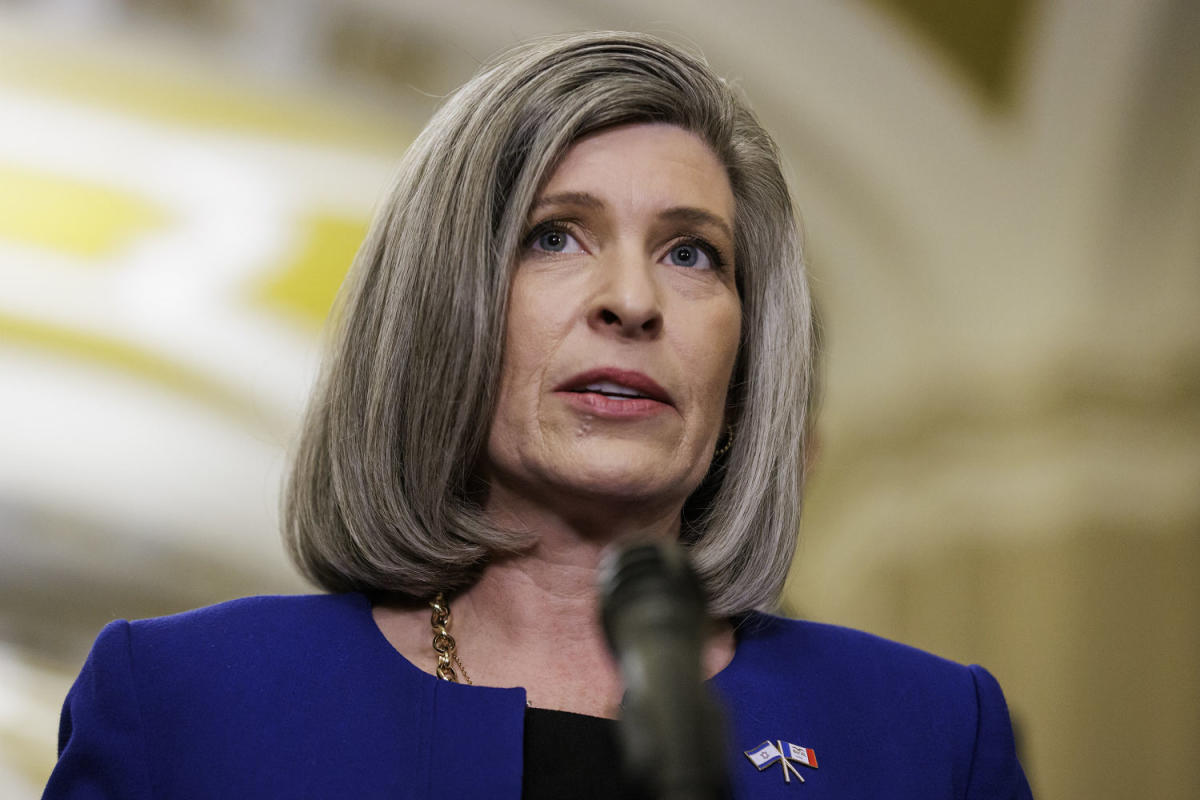Welcome to the online version of From the Politics Desk, an evening newsletter that brings you the NBC News Politics team’s latest reporting and analysis from the White House, Capitol Hill and the campaign trail.
In today’s edition, Sahil Kapur and Garrett Haake offer their takeaways after covering Pete Hegseth's confirmation hearing to be defense secretary. Plus, Steve Kornacki digs into the data to explain why bipartisan votes for presidents’ Cabinet nominees are becoming less common.
Sign up to receive this newsletter in your inbox every weekday here.
Pete Hegseth gets a friendly GOP reception and other takeaways from his confirmation hearing
By Sahil Kapur
Pete Hegseth was met with a friendly reception by Senate Republicans at his hearing Tuesday before the Armed Services Committee, who signaled they would get behind Hegseth, President-elect Donald Trump’s embattled nominee to be defense secretary.
Hegseth came into the hearing with a cloud of controversies hanging over his nomination. But after he was questioned for more than four hours, Republicans came away feeling optimistic that Hegseth, a former Fox News host and Army combat veteran, would be confirmed to lead the Pentagon.
“He comported himself extremely well and made a strong argument for why he ought to be the next secretary of defense,” said Senate Majority Leader John Thune, R-S.D., adding he will “work quickly” to get Hegseth confirmed.
Here are a few takeaways from the hearing.
Joni Ernst doesn’t rock the boat: As a combat veteran and sexual assault survivor, Sen. Joni Ernst, R-Iowa, has long been seen as a linchpin of Hegseth’s path to 50 votes, as she has expressed concerns about him previously. On Tuesday, she did little to challenge him.
She began by noting their “very productive” and “very frank” conversations and submitted a letter from a Hegseth supporter into the record. She asked whether women should have “the opportunity to serve in combat roles,” to which Hegseth replied in the affirmative, “exactly the way you caveated it.” She asked whether he would appoint a senior official dedicated to sexual assault prevention, to which he noted that he had already promised that to her: “As we have discussed, yes, I will,” he said.
Ernst, who faces re-election in 2026, has come under heavy pressure from Trump allies to get behind Hegseth. Lately, she hasn’t shown much of an appetite to buck Trump.
Culture war rhetoric dominates: Throughout the hearing, Hegseth repeatedly lavished praise on Trump and criticized President Joe Biden’s administration, channeling the language of the MAGA movement.
He inveighed against “left-wing woke universities” and attacked the “left-wing media in America,” calling himself the victim of a “smear campaign.”
Democrats press about women in combat: Of all the controversies Hegseth faces, Democrats seemed most eager to take aim at his past remarks that women shouldn’t serve in combat roles.
“You can’t seem to grasp that there is no U.S. military as we know it without the incredible women that we serve, women who earn their place in their units,” said Sen. Tammy Duckworth, D-Ill., who lost her legs serving in combat after her helicopter was shot down in Iraq. “You have not earned your place as secretary of defense.”
Hegseth has softened his opposition to women serving in the military. He said his views, “recently and in the past, and from personal experience,” have been based on “instances where I’ve seen standards lowered.”
Read more takeaways from Sahil →
Haake’s Take: Democratic senators largely struggled to elevate Hegseth’s personal liabilities into the kind of wound that can end a Cabinet bid.
More than two hours into the hearing, Virginia’s Tim Kaine, who has a reputation as a genial guy, was the only lawmaker to persistently pursue answers from Hegseth about a 2017 sexual assault allegation and admitted adultery undergirding it in a manner than might unnerve fence-sitting GOP senators. Asides into tax returns related to previous roles or Hegseth’s understanding of the global issues the next SecDef will face lacked depth.
— Garrett Haake
Bipartisanship is on the decline in Cabinet confirmation votes
By Steve Kornacki
It used to be a question of whether an incoming president’s Cabinet picks would face any opposition in the Senate. Now, as Donald Trump’s nominees begin their confirmation hearings, it’s a matter of how much opposition they will face.
Call it a product of the partisan polarization that had been rising since 2000 and accelerated with Trump’s 2016 victory. Once largely deferential to a new president’s selections, senators from the opposition party have far more incentives to try to thwart them — or at least to make a show of it.
Unanimous or near-unanimous votes on Cabinet nominees remained common through Barack Obama’s inauguration in 2009, when nine of his choices sailed through the Senate with no opposition at all (and five more did so with only token Republican opposition). But the last two incoming presidents, Trump in 2017 and Joe Biden in 2021, saw a sharp drop in such bipartisan consensus.
It’s not that Cabinet fights didn’t exist before the Trump era. But they were uncommon and isolated.
Twelve of George W. Bush’s nominees were unanimously confirmed, for instance, with Democrats focusing their ire on John Ashcroft, who was confirmed as attorney general only after lengthy debate with 42 Democrats voting “no.” (One other Bush pick, Gale Norton for interior secretary, also got a scattering of “no” votes.)
And while not a single vote was ultimately cast against any of Bill Clinton’s nominees, his initial pick for attorney general, Zoë Baird, withdrew in the face of rising opposition during her confirmation hearings. (She had admitted failing to pay Social Security taxes for the undocumented immigrant she employed.)
Overall, though, a sentiment prevailed in the Senate that a new president was entitled to assemble the team he wanted, with “no” votes reserved for outlier cases and symbolic objections.
That thinking shifted with Trump, six of whose picks racked up more than 40 “no” votes in 2017 and just one — veterans affairs secretary nominee David Shulkin, a previous Obama appointee — confirmed unanimously. Betsy DeVos, nominated by Trump to head the Education Department, eked through thanks only to a tiebreaking vote from Vice President Mike Pence — the first ever for a Cabinet nomination.
When Biden was elected in 2020, Republicans returned the favor. A straight party-line vote allowed Xavier Becerra to win confirmation as health and human services secretary, while three other Biden picks got at least 40 “no” votes.
Neither Trump (the first time around) nor Biden actually had any of their nominees rejected by the full Senate, which has happened only nine times, most recently in 1989, when John Tower was voted down to run the Pentagon under George H.W. Bush. Tower was attacked over allegations of excessive drinking, and with Democrats enjoying a sizable majority at the time, they had the numbers to block his nomination.
That looms as a potentially key difference in the current fight over Trump’s most endangered nominee, Pete Hegseth, whose bid to lead the Defense Department has been complicated by allegations that parallel those of the Tower fight. But unlike Bush back then, Trump’s party has a Senate majority.
🗞️ Today’s top stories
📝 Report card: Special counsel Jack Smith defended his 2020 election interference investigation in a report that was made public early Tuesday, saying a jury would have convicted Trump. Read more →
📝 Report card, cont.: In another report that was released Monday, special counsel David Weiss criticized President Joe Biden for pardoning his son Hunter. Read more →
✉️ Inauguration RSVPs: Elon Musk, Jeff Bezos and Mark Zuckerberg will attend Trump’s inauguration Monday, while Michelle Obama won’t.
🚫 Out of office: Minnesota’s Democratic state representatives declined to show up for the first day of the legislative session to deny the state House a quorum amid a fight over how to manage a chamber that's set to be equally divided. Read more →
🪫 Fueling up: Forget coffee, soda and Red Bull: Celsius is the drink members of the U.S. government are increasingly turning to for a caffeine fix, The Washington Post reports. Read more →
That’s all From the Politics Desk for now. Today’s newsletter was compiled by Adam Wollner and Scott Bland.
If you have feedback — likes or dislikes — email us at [email protected]
And if you’re a fan, please share with everyone and anyone. They can sign up here.
This article was originally published on NBCNews.com

 German (DE)
German (DE)  English (US)
English (US)  Spanish (ES)
Spanish (ES)  French (FR)
French (FR)  Hindi (IN)
Hindi (IN)  Italian (IT)
Italian (IT)  Russian (RU)
Russian (RU) 























Comments